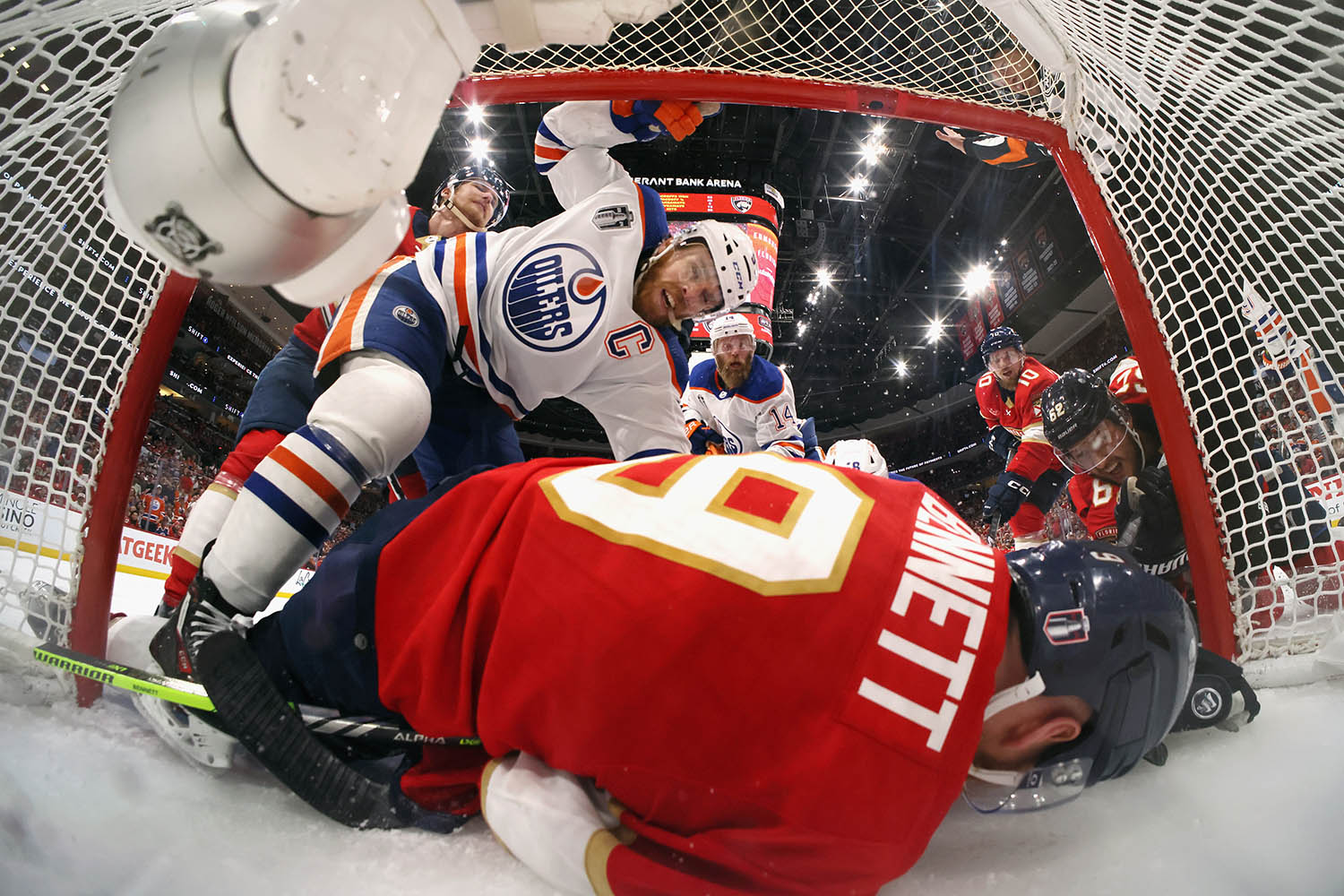The last time a Canadian franchise won ice hockey’s Stanley Cup, Groundhog Day was in the cinemas and Whitney Houston’s I Have Nothing was in the music charts. It is fitting that since then Canada has been invariably left empty-handed in its national winter sport.
It can feel wrong-headed to apply the term “all other things being equal” to sporting outcomes. From humidity levels inside an arena to the armspan of a goalkeeper, all other things are never equal. That said, the odds of a Canadian team not winning the Stanley Cup in 32 years normally work out at less than 1%. One analysis found it would have been more likely for Canada to win at least 10 trophies than zero.
But all this could be about to change. Game one of the Stanley Cup final is on Wednesday evening and it’s a repeat of last year: Florida Panthers vs Edmonton Oilers.
The Panthers are based in Miami, where it hasn’t snowed for nearly half a century. The Oilers are from the Canadian city of Edmonton, where winter lasts from November until March. The Panthers have made a third final in a row; the Oilers want revenge after losing in 2024.
The question about whether a Canadian team can break a three-decade duck is intriguing enough. But this year’s final also carries the frisson of political discord, because both teams are connected to their national leaders. The US president Donald Trump is a transplant to Florida who considers the Panthers owner Vincent Viola a “friend” and in February invited the team to the White House. Canada’s prime minister Mark Carney grew up in Edmonton and is a lifelong Oilers fan.
The men have made no bones about their competing visions for Canada and the world. Trump has repeatedly threatened to annex his northern neighbour and make it a “51st state” – to which Carney has firmly demurred. Tensions between the two countries have, at times, spilled over to the arena. When the US played Canada in February as part of the NHL’s 4 Nations Face-Off tournament, rival fans booed each other’s anthems. In one of the games in Montreal’s Bell Centre, there were three fights on the ice in the first nine seconds. Before the final, which was won by Canada, Trump called up the US team.
It was natural then that ice hockey played a supporting role in Carney’s election campaign a few weeks later. His rallying cry “Elbows Up!” harked back to Gordie Howe, the Canadian hockey legend known as Mr Elbows for the way he took the fight to his opponents. (Ironically he spent nearly his whole career playing for an American franchise.) Carney also appeared in a campaign video with the actor Mike Myers wearing a national team jersey. In one pre-election stump speech, the former central banker told crowds: “The Americans, what they’re going to find out, is that in this trade war, just like in hockey: We. Will. Win.”
This may be true in the Winter Olympics, where the Canadian men’s ice hockey team has triumphed in three of the past six Games and twice beat the US in the gold medal match. But it is false when it comes to the Stanley Cup, at least in recent history. Between 1893 (when the cup was first awarded) and 1993 (when a Canadian franchise last won) only 16 finals didn’t feature a team from north of the border. Since then there have been 23.
There are countless theories as to what’s behind the drought: cold weather, taxes, the NHL commissioner Gary Bettman, media pressure, even a curse. If you have ever sought answers, you may have heard all this already. But a convincing explanation is hard to come by.
Take the Bettman theory. Since taking up his role in 1993, the league’s first and only commissioner has focused on the American market, where there is most room for growth. This has brought an expansion in US teams competing in the NHL. New franchises have emerged in eight states under Bettman. Two Canadian teams have also relocated south of the border, while one has gone in the other direction.
Newsletters
Choose the newsletters you want to receive
View more
For information about how The Observer protects your data, read our Privacy Policy
This would explain Canada’s string of losses to some degree, except it’s baked into calculations about the likelihood of the recent failures. Even with just seven teams in a league of 32 – the US has the remaining 25 – a Canadian franchise ought (statistically) to have won at some point in the past thirty years.
Concerns that generous or non-existent state taxes help lure players to the US seem well-founded at first too. Only one Stanley Cup final since 2016 has featured two teams subject to state or provincial income tax levies, which are paid on earnings from home games. But the NHL agent Allan Walsh has suggested that players in Canada can work out ways to pay the same or less tax than in the US.
And is this such a draw anyway? Kelly Hrudey, a hockey analyst and former player who was on the losing end of the 1993 Stanley Cup final, is unconvinced. “When the Tampa Bay Lightning and Florida Panthers were bad hockey teams, there were no players walking down there,” he said.
Asked to give his own pet theory on the drought, he was honest: “I have no idea.” An Edmonton native, Hrudey played his entire career in the US not because of tax rates but because that’s where he got deals.
Grand theories are fun, but they risk distracting from the cruelty of fine margins. Canadian teams don’t do badly in the regular season and they have had their fair share of near misses in the playoffs. The Calgary Flames lost the 2004 Stanley Cup final in the deciding game. So too the Edmonton Oilers in 2005, the Vancouver Canucks in 2011 and the Oilers (again) in 2024. Any of these finals could have gone the other way, regardless of income taxes, league expansion or average snowfall.
This should provide comfort to the Oilers as they go into game one. Whatever the constellation of factors working against them, they have made it to the final. Luck has dealt them a bad hand with the loss of one of their stars, Zach Hyman. But they have home ice advantage and a strength in depth that they lacked last year. No matter what the numbers say, one team can change their country’s stars.
Photograph by Bruce Bennett/Getty Images

